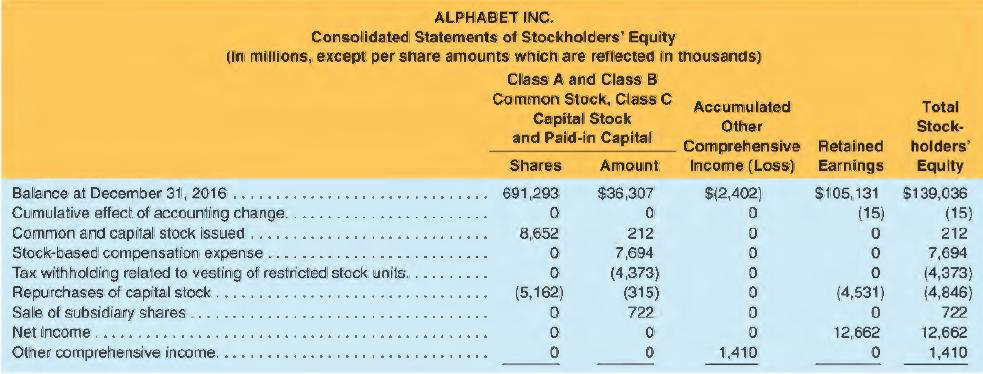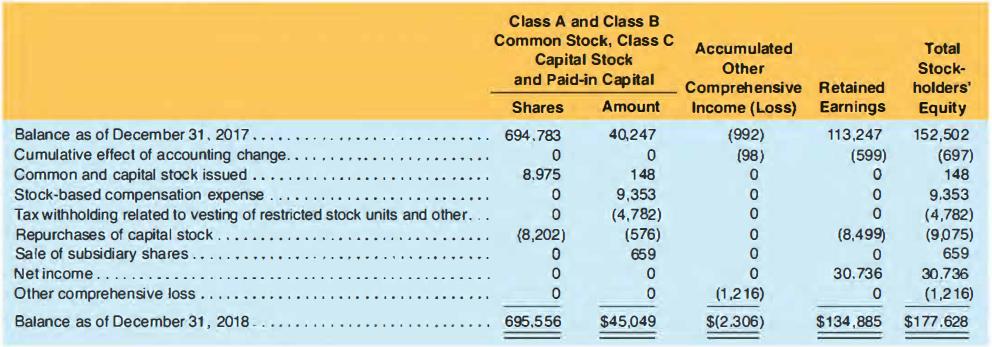The 2017 and 2018 statements of stockholders' equity for Alphabet Inc. are presented below along with portions
Question:
The 2017 and 2018 statements of stockholders' equity for Alphabet Inc. are presented below along with portions on Notes 10 and 12 relating to stockholders' equity and equity-based compensation..


Note 10: Stockholders' Equity
Convertible Preferred Stock
Our board of directors has authorized 100 million shares of convertible preferred stock, $0.001 par value, issuable in series. As of December 31, 2017 and 2018, no shares were issued or outstanding.
Class A and Class B Common Stock and Class C Capital Stock
Our board of directors has authorized three classes of stock, Class A and Class 8 common stock, and Class C capital stock. The rights of the holders of each class of our common and capital stock are identical. except with respect to voting. Each share of Class A common stock is entitled to one vote per share. Each share of Class B common stock is entitled to 10 votes per share. Class C capital stock has no voting rights, except as required by applicable law. Shares of Class B common stock may be converted at any lime al the option of the stockholder and automatically convert upon sale or transfer lo
Class A common stock.
Share Repurchases
In October 2016, the board of directors of Alphabet authorized the company to repurchase up to $7.0 billion of its Class C capital stock, which was completed during 2018. In January 2018, the board of directors of Alphabet authorized the company to repurchase up to $8.6 billion of its Class C capital stock. The repurchases are being executed from time to time, subject to general business and market conditions and other investment opportunities, through open market purchases or privately negotiated transactions, including through Rule 10b5-1 plans. The repurchase program does not have an expiration date. During the years ended December 31, 2017 and 2018, we repurchased and subsequently retired 5.2 million shares of Alphabet Class C capital stock for an aggregate amount of $4.8 billion and 8.2 million shares of Alphabet Class C capital stock for an aggregate amount of $9.1 billion, respectively.
Note 12: Compensation Plans
Stock Plans
Under our 2012 Stock Plan, RSUs or stock options may be granted. An RSU award is an agreement to issue shares of our publicly traded stock at the time the award vests. Incentive and non-qualified stock options, or rights to purchase common stock, are generally granted for a term of 10 years. RSUs granted to participants under the 2012 Stock Plan generally vest over four years contingent upon employment or service with us on the vesting date.
As of December 31, 2018, there were 31,848,134 shares of stock reserved for future issuance under our Stock Plan.
Stock-Based Compensation
For the years ended December 31, 2016, 2017 and 2018, total stock-based compensation expense was $6.9 billion, $7.9 billion and $10.0 billion, including amounts associated with awards we expect to settle in Alphabet stock of $6.7 billion, $7.7 billion, and $9.4 billion, respectively. For the years ended December 31, 2016, 2017 and 2018, we recognized tax benefits on total stock based compensation expense which are reflected in the provision for income taxes in the Consolidated Statements of Income, of $1.5 billion, $1.6 billion, and $1.5 billion, respectively.
For the years ended December 31 , 2016, 2017 and 2018, tax benefit realized related to awards vested or exercised during the period was $2.1billion, $2. 7biIlion and $2.1billion. respectively, These amounts do not include the indirect effects of stock-based awards, which primarily relate to the research and development tax credit.
Stock-Based Compensation:
The following table summarizes the activities for our options for our unvested RSUs for the year ended December 31, 2018:
As of December 31, 2018, there was $16.2 billion of unrecognized compensation cost related to unvested employee RSUs. The amount is expected to be recognized over a weighted average period of 2.5 years.
Note 11. Net Income Per Share (in part)
We compute net income per share of Class A and Class B common stock and Class C capital stock using the two-class method. Basic net income per share is computed using the weighted-average number of shares outstanding during the period. Diluted net income per share is computed using the weighted-average number of shares and the effect of potentially dilutive securities outstanding during the period. Potentially dilutive securities consist of restricted stock units and other contingently issuable shares. The dilutive effect of outstanding restricted stock units and other contingently issuable shares is reflected in diluted earnings per share by application of the treasury stock method. The computation of the diluted net income per share of Class A common stock assumes the conversion of Class B common stock, while the diluted net income per share of Class B common stock does not assume the conversion of those shares.
REQUIRED:
a. What is the difference between Alphabet's Class A common stock and its Class B common stock? Why do they have two different classes of common stock? In fiscal year 2014, Alphabet created shares of Class C capital stock, which participate in any common dividends, but have no voting rights. What might be the purpose of the Class C stock?
b. Alphabet repurchased some of their Class C shares in 2018. Prepare the journal entry to show the repurchase transaction.
c. Using the information in the notes, estimate the stock-based compensation expense for 2019 related to the 2018 grants of restricted stock units. Show the journal entry.
d. Alphabet states that there is $16.2 billion of unrecognized compensation cost related to unvested employee RSUs. What are these and why isn't this a liability on the balance sheet for Alphabet?
e. Alphabet reported net income of $30,736 million in 2018 and basic EPS of $44.22 per share. Estimate the weighted average number of shares used to calculate basic EPS.
f. Assume Alphabet has 15.0 million stock options outstanding at the end of 2018. If all outstanding stock options were exercised in 2018, what would be the impact on Alphabet's basic EPS?
g. Alphabet reported diluted EPS of $43.70 in 2018. What are the primary dilutive securities that Alphabet mentions?
Step by Step Answer:

Financial Accounting
ISBN: 9781618533111
6th Edition
Authors: Michelle L. Hanlon, Robert P. Magee, Glenn M. Pfeiffer, Thomas R. Dyckman





